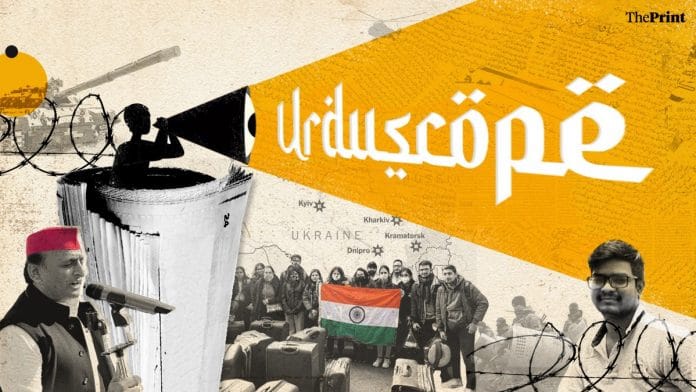New Delhi: The ongoing Russian assault on Ukraine, the devastation caused by the war there, and India’s “last minute evacuation” of its nationals from the war-torn country remained the top talking points in Urdu newspapers this week.
News of the conflict in the eastern European country pushed coverage of the hijab row in Karnataka almost entirely off the front pages, after many weeks in the spotlight. Even news of the ongoing assembly elections in India were pushed to the inside pages occasionally, as the Russia-Ukraine war dominated front page space.
ThePrint brings you a wrap of what made headlines in the Urdu press this week.
Russia-Ukraine war
On 4 March, Inquilab and Siasat carried articles on the front pages about the government of India taking opposition parties into confidence on the war in Ukraine, the efforts to get Indian citizens out of there, and the government’s position on the matter. Roznama Rashtriya Sahara, however, led with how the war had also started impacting the value of the rupee. It also carried a report on the rising prices of crude oil.
On 1 March, Roznama led with Prime Minister Narendra Modi’s high-level meeting and the decision to send four Union ministers — Hardeep Singh Puri, Kiren Rijiju, Jyotiraditya Scindia and Gen. V. K. Singh (retd) to Ukraine’s neighbouring countries to bring back the Indian students stranded in the war-torn country.
The lead story in Siasat on 26 February was about Russia’s stand that it is ready for talks, provided Ukraine gets rid of its ruling dispensation. The death of Indian student Naveen Shekharappa in shelling in the city of Kharkiv was on the front pages of all three newspapers on 2 March.
The stories of returning students from the war-torn nation were carried in all newspapers, but in an editorial on 3 March, Roznama was critical of what it called the Modi government’s penchant for making political hay out of every situation, be it war or peace. Citing PM Modi’s reference to the war and Indian students in Ukraine during his speech in an election rally in Uttar Pradesh, the paper said that everything including the naming of the evacuation plan as ‘Operation Ganga’ and the sending of ministers to oversee evacuation — which made the very existence of Indian embassies in Ukraine’s neighbouring countries meaningless, the paper argued — was done with an eye on the UP elections.
In an editorial on 2 March, Inquilab explained what a fine line India has had to tow in its decision to abstain on UN resolutions on Russia’s aggression, and claimed that the present moment would test the Modi government’s strategic prowess. On the same day, a Roznama editorial blamed the government’s delay in decision-making. It wrote that the situation had not worsened in a day and while several countries, including the US, had already asked its citizens to leave Ukraine, the government of India was so busy with the elections in five states that it could not move in time to save its citizens’ lives.
Also read: Quad leaders say Ukraine sovereignty, territorial integrity key to peaceful, stable Indo-Pacific
UP assembly elections
The Russia-Ukraine war pushed news of the assembly elections in Uttar Pradesh off the lead spot, but it remained on the front pages, as voting in the fifth and sixth phases took place.
On 26 February, while most of the front page news was about Ukraine, Siasat carried a photo of Samajwadi Party president Akhilesh Yadav campaigning with a mace in his hand and large crowds in the background.
In an editorial on 1 March, Roznama noted the decreasing voting percentages in Uttar Pradesh and Uttarakhand, and wrote that voters in the Hindi belt of the country seem to be a little more reluctant to exercise their franchise than in other states. Nowhere except in these two states, said the paper, have the voting percentages gone below 70.
On 4 March, Siasat highlighted Akhilesh Yadav’s promise of distributing free ghee along with free rations, if elected to power. The article was carried alongside a photo of the SP chief campaigning with West Bengal Chief Minister Mamata Banerjee.
Inflation and related politics
Inflation remained a talking point on the front pages of Urdu newspapers through the week. On 2 March, under a banner headline on how the common man continues to suffer from high inflation in prices of essential goods, Roznama carried two stories — one about the price of LPG increasing by Rs 105 per cylinder and another on the price of milk going up. It also carried a statement by Congress leader Rahul Gandhi that the government is indifferent to the sufferings of the people and is not taking any steps to control the inflation. A day earlier, the paper had carried on the front page news about Amul milk becoming dearer by Rs 2 per litre.
The Siasat front page on 2 March also included news about the increase in LPG prices, and an inset in a story that quoted Akhilesh Yadav as saying that people would get rid of a government that has fleeced them.
Dropout rates and probability of early marriage
On 3 March, Roznama carried a report by NGO Save the Children that showed that under the Covid lockdown, 67 per cent girls (across the country) were deprived of education. The same number of girls were also deprived of medical and nutritional services.
Many of them, the report said, were likely to be married sooner than they would have otherwise been. In an editorial on 28 February, Inquilab questioned the government on what plans it has in place to control dropout rates and accused it of paying little attention to the problem.
(Edited by Poulomi Banerjee)
Also read: ‘States did it first’: Modi justifies 2020 Covid lockdown, denies govt agencies misused for polls






